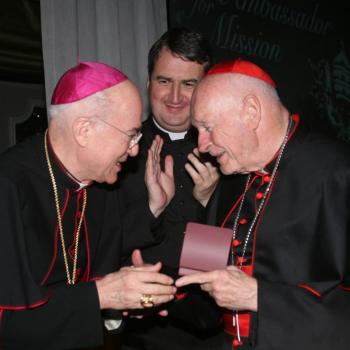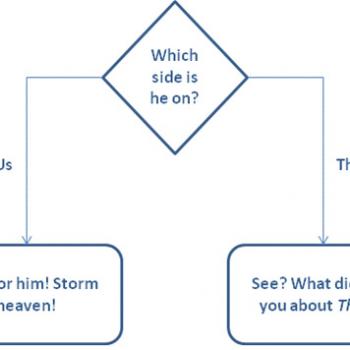Rod Dreher on the latest bit of episcopal boneheadedness, appointing a guy who is a confessed gay/bisexual groper of kids, forbidden by the court to be around childen in perpetuity, to be in charge of priestly formation in Newark, NJ. Smart. Dreher writes:
Ah, so the guy won’t be around children, so what’s the problem? The problem is you have a man whose moral character is so defective that he’s not allowed, under agreement with the police, to be around children — and you’ve put him in charge of the ongoing formation of priests. What is it about clericalist bishops? It beggars belief.
Actually, Fugee’s conviction was overturned by an appeals court on a technicality:
The decision was based, in part, on the judge’s decision to let the jury hear the portion of Fugee’s statement in which he described himself as bisexual or homosexual.
The appellate court said the admission could have led jurors to find Fugee guilty because of the “unfounded association between homosexuality and pedophilia.” The rest of the confession was not called into question.
Rather than retry Fugee, prosecutors reached an agreement to put him in a rehab program for first-time sex offenders, and to bar him from being alone with kids for the rest of his life. But as far as the Archdiocese of Newark is concerned, Fugee is not only clean, but he is, in fact, a victim too:
Goodness, the spokesman, characterized Fugee as a victim in the case, saying the priest had been through a “terrible ordeal.”
So: a gay or bisexual sex offender priest who kind of got off on a technicality (because a judge worried about homophobic jurors) was chosen by the Archbishop of Newark to head the priestly formation office, and one is told that in fact, this priest is a victim in all of this.
Insert head shake here. When Dreher’s right, he’s right.
Dreher concludes with, I think, an astute observation:
Let me clarify what I’m interested in here. I take it for granted that some bishops and church leaders make these kinds of calls because they are bad men with something to hide. But I think many others make this kind of call out of a malformed sense of charity, abetted by a sense, likely unconscious, that the clergy are “real” to them in a way the laity are not.
I think this is about right. An appointment like this doesn’t feel to me like some sort of malicious conspiracy so much as a conception of the Church which sees priests as the *real* Catholics who are working through their issues with sin and redemption while the rest of us–the ones with children at risk should the drama of padre’s struggle with his appetites take another turn for the worse–don’t really seem to figure into the equation. The thought that the rest of us might feel, oh, endangered by a guy like this being in charge of the formation of priests who will then bring his moral wisdom to bear on the rest of us and our kids doesn’t seem to occur to Abp. Myers. The main issue appears to be finding some way for this priest to work out his redemption. We laity seem to be bit players in that deeply clerical drama in which the ordained play starring roles.
Now, I’m all for mercy, second chances, redemption and ways for the fallen to find forgiveness and a new shot at sainthood after a fall. So while I have no problem at all calling out people I think are sinning gravely in thought and word, particularly when it seems to me they gravely endanger innocents by doing so, I think the frank and open bloodlust for vengeance some Catholics display for those guilty of sins to which they themselves are not prone is embarrassing. The gospel, it seems to me, is uncompromising in condemning sin–and uncompromising in declaring that the very worst sinner is still a candidate for sainthood with a shot at redemption if they will only take even the feeblest steps toward cooperating with grace. So I don’t place such men outside the pale of redemption and I have admiration for those who retain the willingness to extend them mercy and the chance at healing and sanctity. I owe a lot to people who have not coddled me about my own sins–and I’ve been forgiven enough of my own sins that I am loath to kick anybody out of the kingdom. But some prudence would be good too. I have no interest in seeing Fr. Fugee punished. But still and all, how about letting Fr. Fugee work out his salvation with fear and trembling in some way that does not fill the rest of the faithful with the sense that we don’t really matter all that much in a narcissistic universe where clergy are the stars of the show? That is how it sounds an awful lot of times when spectacles like this play out, whether in Newark, or on Cdl. Mahony’s blog.











